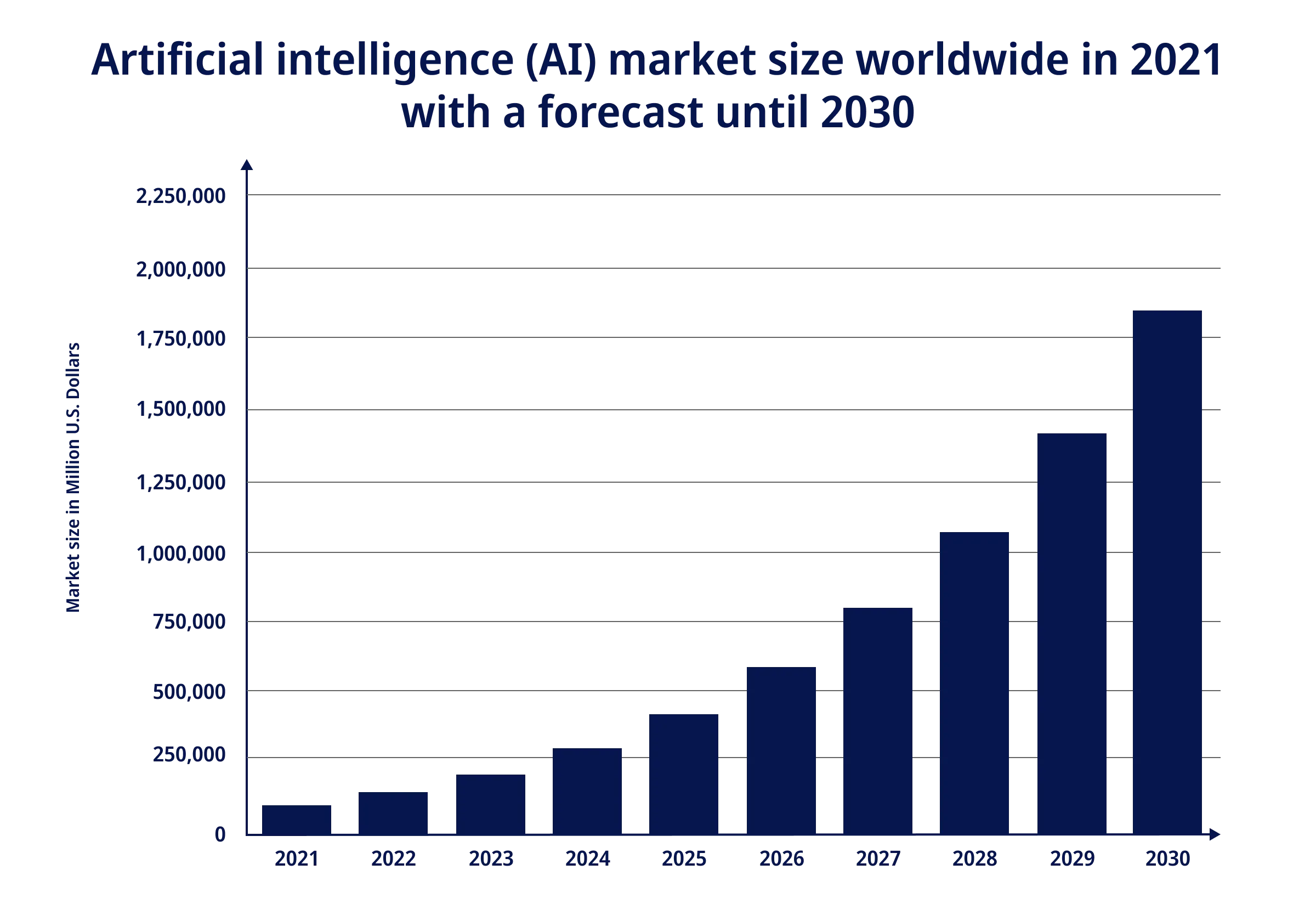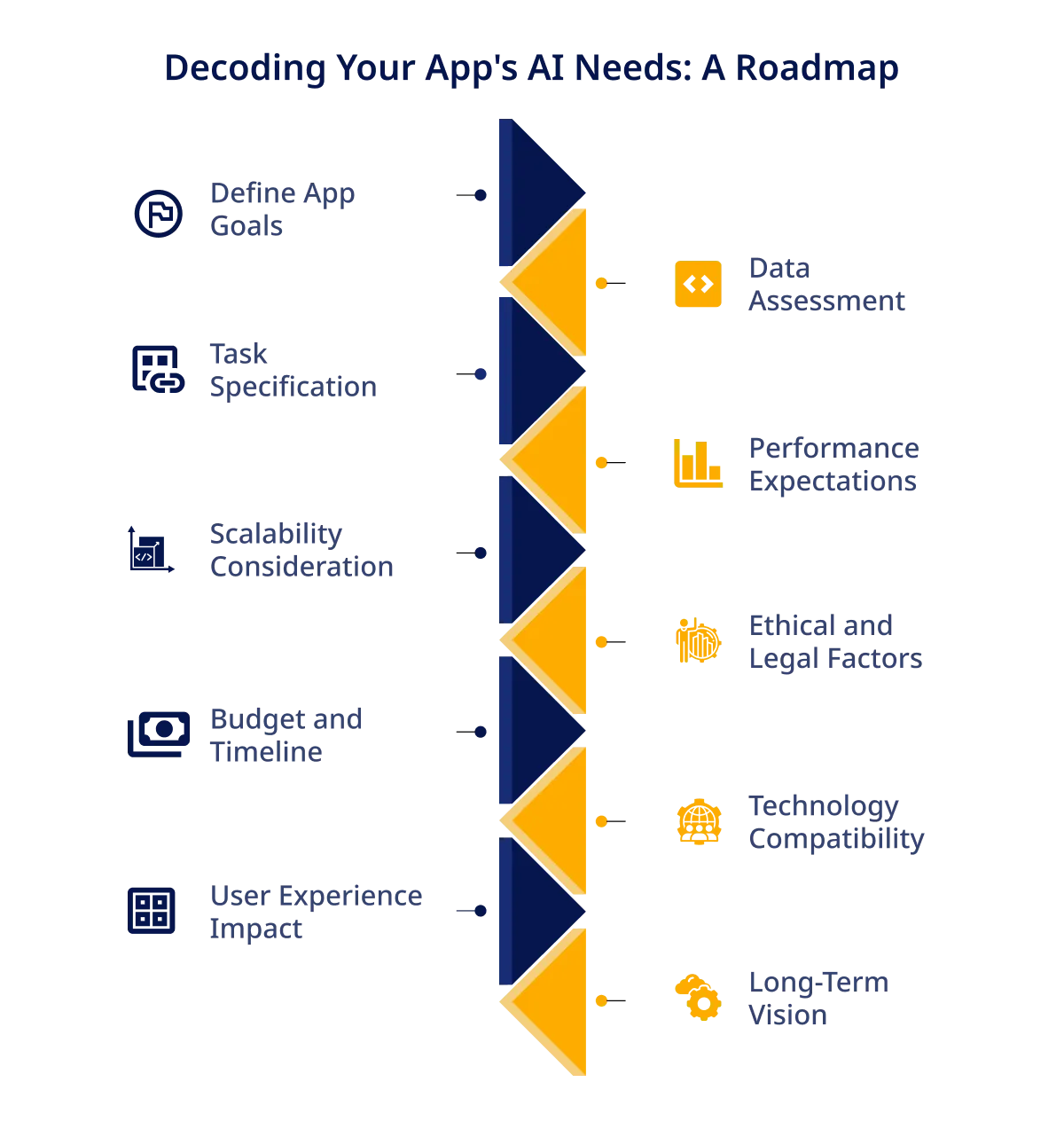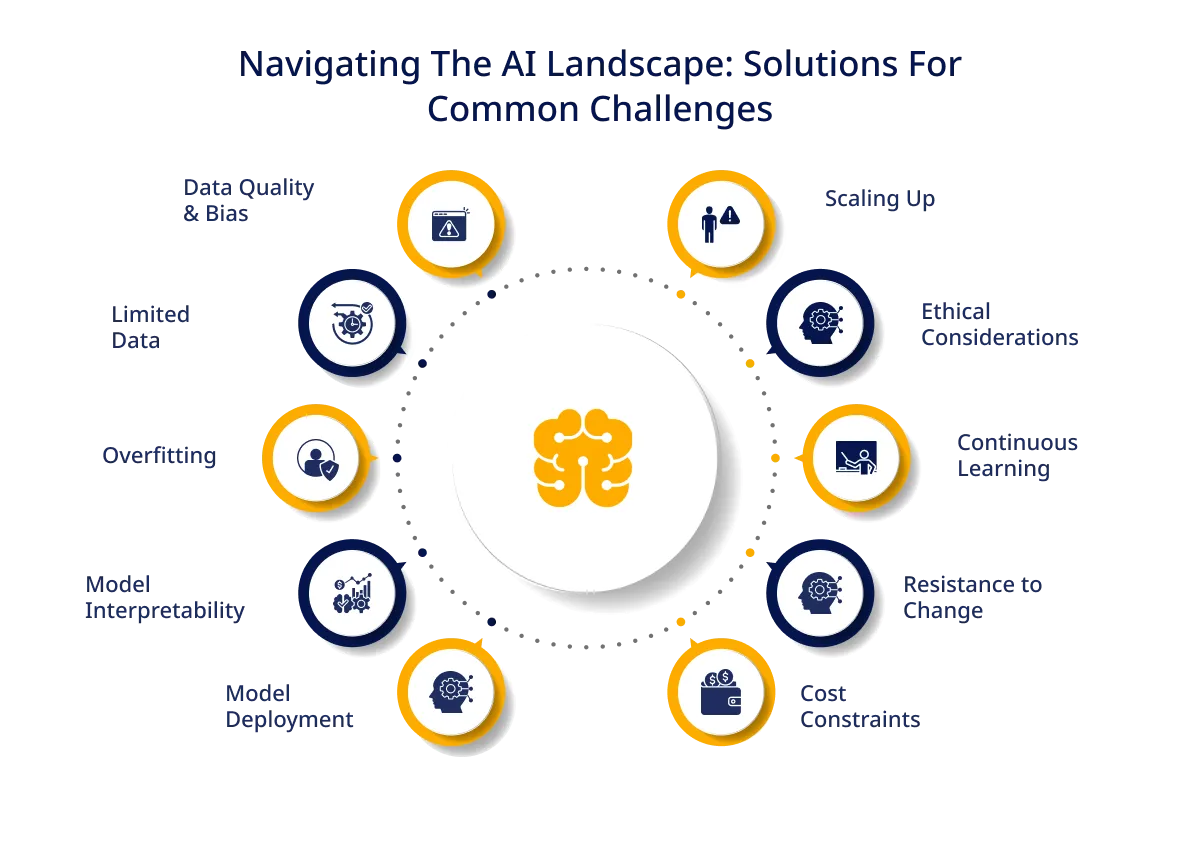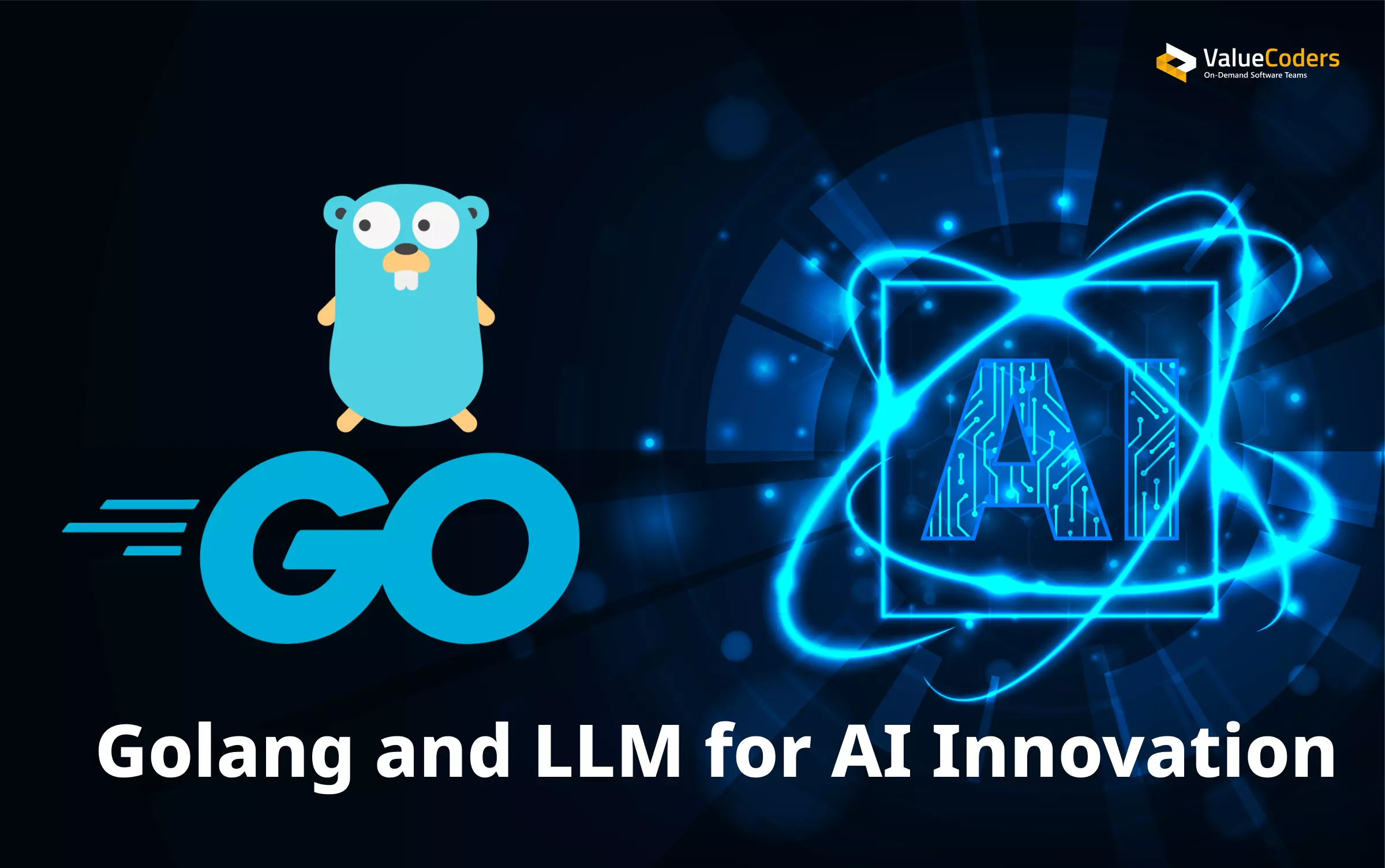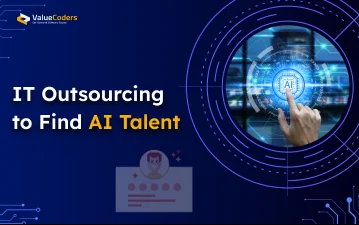Apps like Siri, Alexa, and ChatGPT are some of the most popular mobile apps out there and owe their appeal to the power of artificial intelligence.
Integrating AI is no longer just for tech giants – it’s fast becoming a must-have for any cutting-edge app. A recent Deloitte study found that over 50% of organizations will incorporate AI and automation technologies in 2023.
However, the biggest challenge they often face before implementing this revolutionary technology is finding a suitable model for their business apps.
The countless choices, machine learning models, machine learning APIs, neural networks, and models tuned for tasks like computer vision or natural language can make it challenging to pick one option.
To simplify this, we’ll guide you to find a suitable model for your AI-based app in this post. We’ll uncover the critical factors in play when determining the perfect algorithm.
Also read: Machine Learning Development Companies Supporting SME & Enterprises ML Adoption
Understanding AI Models for Apps
A survey by Global 500 companies stated that business leaders investing in AI automation, tools, and software solutions are expected to witness significant growth within the next few years.
This could be the right time for your business to consult an AI development company to explore the possibilities of leveraging this revolutionary technology.
AI has become a transformative force behind the fast-paced mobile & web app intelligence world. With the help of AI-powered applications, businesses can manage various complex tasks efficiently without the involvement of humans.
For any AI app builder or developer, AI models play a crucial role in elevating the performance & user experience of their applications.
Applications with AI models can analyze user behavior and create valuable insights leading to data-driven decision-making.
Significance of Selecting the Right AI Model for App
AI models are sophisticated algorithms designed to mimic human intelligence, enabling apps to perform complex tasks autonomously and adapt to user behavior.
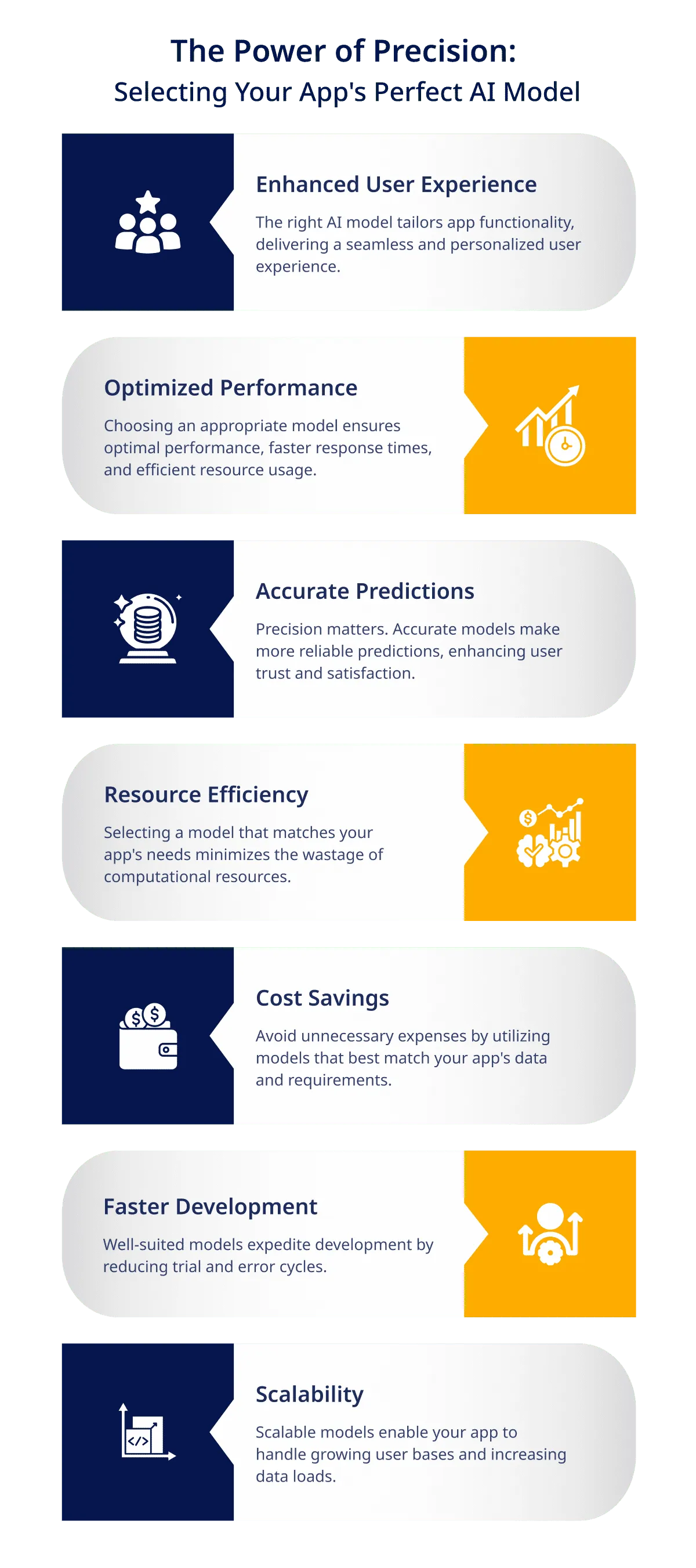
By harnessing the potential of AI models, AI app builders or developers can unlock a range of functionalities, including natural language processing, image recognition, predictive analytics, and personalized recommendations.
Here are some of the common models of AI:
- Machine Learning: A widely used approach where models learn from data patterns to make predictions or decisions without explicit programming.
- Deep Learning: Inspired by the human brain’s neural networks, deep learning models excel in tasks like image recognition, natural language processing, and voice recognition.
- Natural Language Processing (NLP): AI models in NLP allow apps to comprehend and interact with human language, enabling chatbots and voice assistants.
- Predictive Analytics: Predictive models forecast future events based on historical data, enabling apps to make proactive decisions.
Explore how our expertise can fine-tune your app's AI for maximum impact.
Understanding the different types of AI models empowers AI builders or developers to choose the most suitable approach for their specific use case.
Chatbot development services are one of the most preferred AI services by businesses. By incorporating these intelligent algorithms into apps, businesses can create personalized and adaptive experiences that captivate an educated audience.
Potential Challenges of Implementing AI Models in Apps
Despite the immense potential, integrating AI models into apps comes with challenges that require careful consideration and problem-solving.
Whether you are an AI services company or an AI app builder (developer), do not ignore these challenges:
- Data Quality and Availability: Building effective AI models hinges on high-quality and diverse data. Inadequate or biased data can compromise model accuracy and reliability.
- Model Training and Tuning: Fine-tuning AI models demands expertise and meticulousness. Achieving optimal performance often involves iterative training cycles and parameter adjustments.
- Resource Intensiveness: Complex AI models, particularly in deep learning, demand significant computational power and may strain app resources.
- Interpretability and Explainability: AI models can be complex “black boxes,” making it challenging to interpret their decision-making process. Ensuring transparency is essential, especially in critical applications.
- Overfitting and Generalization: AI models may excel in training data but struggle to generalize to new data. Avoiding overfitting requires balancing model complexity and data diversity.
- Ethical Considerations: AI models can unintentionally perpetuate biases in the data, leading to unfair outcomes. Ensuring ethical AI practices is crucial.
- Deployment and Integration: Integrating AI models into existing app infrastructures may present technical challenges, requiring compatibility and scalability.
- User Acceptance and Adoption: Users may hesitate or mistrust AI-powered features due to privacy concerns or lack of understanding.
- AI Builder Limitations: While AI builder tools offer ease of use, they may need more customization and performance than custom-built AI models.
- Security and Privacy: As AI models handle sensitive user data, ensuring robust security measures and data privacy becomes paramount.
Overcoming these challenges necessitates a thoughtful approach, collaboration with AI specialists, and continuous monitoring. Embracing AI models with a clear understanding of their capabilities and constraints empowers app developers to create cutting-edge experiences that resonate with users and drive innovation.
Further reading: What Are The Top AI Software Development Tools?
Identifying Your App’s AI Requirements
To begin with your AI model, it is vital to understand your application’s needs. Does it need an AI app builder/developer or machine learning solutions?
Or do you need an Artificial Intelligence (AI) services company to guide and advise you toward the right AI model?
Identifying the precise AI requirements can ensure you select the model that perfectly aligns with your app’s purpose and user expectations.
The following points would help you discover the app’s prerequisites without any failure:
1. Target Audience & User Expectations: The path to a successful AI model for application begins with understanding your target audience & their expectation. Whether you are an AI app builder or development company, developing an AI model for your application is only possible by knowing your audience.
To do this efficiently, you can hire a data science development company or instruct your in-house team to review the data carefully.
2. Identifying specific tasks & functionalities: Identify the precise tasks your app wants AI to complete. Clarifying certain features, such as image recognition, language comprehension, or content recommendation, aids in selecting the best AI model.
3. Clear and comprehensive list of AI requirements for your app: Make a detailed list of the AI requirements specific to your app’s objectives. This covers picture recognition, linguistic interpretation, and tailored suggestions.
By describing these requirements, you can ensure that the AI model selected fully suits your service’s goals and user expectations. You can also hire machine learning engineers to help you identify your AI requirements.
Also Read: How AI is Changing Software Testing Forever?
Evaluating AI Models For Your App
Once the identification process of your app’s AI requirements is done, you can move to evaluation.
A meticulous evaluation process is essential when selecting the ideal AI model for your application.
The effectiveness of an AI model goes beyond technical specifications; it must harmonize seamlessly with your app’s objectives and user expectations.
Here’s a brief guide to navigating this crucial phase:
- Performance Metrics: Assess an AI model’s performance through metrics like accuracy, precision, recall, and the F1 score. These metrics illuminate the model’s ability to classify and predict correctly. Connect with an AI consulting service company like ValueCoders to understand this better and make the right decision.
- Resource Demands: Consider the computational resources demanded by the AI model. Efficient resource utilization is pivotal for ensuring your app’s responsiveness and scalability.
- Latency Matters: Whether you choose chatbot or machine learning solutions, the speed at which an AI model processes data impacts user experience. Choose a model that aligns with your app’s real-time requirements.
- Customization Flexibility: Opt for a model that accommodates customization. Tailoring the model to your app’s unique needs can yield enhanced outcomes.
- Domain Alignment: Scrutinize how well the AI model aligns with your app’s domain and the context of its usage. An AI model adept at recognizing natural language might not excel in image processing.
- Real-World Testing: Rigorously test the AI model within the app environment. Real-world scenarios often reveal nuances that controlled tests might miss.
- A/B Testing: Employ A/B testing to compare the performance of different AI models. This empirical approach provides insights into which model performs better for your app’s audience.
Let us guide you in selecting the perfect AI model to unlock new levels of business efficiencies.
Implementing & Integrating AI Models
Here comes the most crucial & final stage of implementing the appropriate AI model for your application.
By now, you must have understood that AI models in your app require a strategic and meticulous approach to ensure seamless functionality and user satisfaction.
Whether you are an AI app builder or a company, below are the key points to keep in mind while effectively implementing and integrating AI models:
- Model Preparation: Begin by acquiring or training the chosen AI model based on your app’s requirements and data.
- Data Preprocessing: Clean, preprocess, and format your app’s data to align with the model’s input specifications. Proper data preparation is crucial for accurate predictions. Someone from a data engineering background would be able to do this skillfully.
- Integration Framework: Choose an integration framework or library that supports the AI model and your app’s development environment.
- API Integration: If the AI model is available as a service, integrate it using APIs to enable communication between your app and the model.
- Performance Testing: Rigorously test the integrated AI model’s performance in controlled settings and real-world scenarios.
- Optimization: Fine-tune the model’s parameters for optimal performance within your app’s context. Optimization can significantly enhance accuracy and speed.
- User Interface: Design a user interface seamlessly incorporating AI-generated insights or features. The integration should enhance the user experience without causing disruption.
- Monitoring & Maintenance: Implement continuous monitoring to track the model’s performance and identify any issues. Regular maintenance and updates ensure long-term success.
- Scalability Planning: Consider how the AI model will scale as your app gains more users. Ensure that the infrastructure can handle increased demand.
- User Education: Provide clear explanations or tutorials for users with AI-driven features. Transparency fosters user trust and understanding.
By following these steps and embracing a user-centric perspective, you’ll ensure a successful integration of AI models into your app.
The seamless blend of technology and user experience is the hallmark of a well-implemented AI solution.
Also Read: How AI-driven Analytics is Shaping Mobile App Strategies in Real Estate
Overcoming Common Challenges
Integrating AI models into apps is challenging, but these challenges can be effectively tackled with foresight and planning. Here’s an expert overview of the common obstacles and how to surmount them:
- Data Quality and Quantity: Often, AI models demand substantial, high-quality data for training. Collect and preprocess relevant data to enhance model accuracy.
- Bias and Fairness: AI models can inherit biases from their training data, potentially leading to unfair outcomes. Regularly audit and adjust models to ensure fairness.
- Model Complexity: Complex models might strain app performance and slow down responses. Opt for models that strike the right balance between accuracy and speed.
- Resource Constraints: Limited computational resources can hinder model deployment. Explore techniques like model pruning or leveraging cloud services to optimize resource usage.
- User Adoption and Education: Users might need to be more familiar with AI-driven features or skeptical about their benefits. Provide intuitive interfaces and clear explanations to encourage usage.
- Privacy Concerns: Handling user data requires meticulous privacy measures. Implement robust data protection protocols to maintain user trust.
- Cost Management: Some AI models and services come with costs that must be managed effectively within your app’s budget.
- Integration Complexity: Integrating AI models seamlessly with existing app infrastructure can be challenging. Choose frameworks or platforms that simplify integration.
- Continuous Monitoring: Models can degrade over time due to changing user behavior or shifts in data patterns. Set up continuous monitoring to identify and rectify performance declines.
By addressing these challenges head-on and devising proactive strategies, you can navigate the intricate landscape of AI integration.
Adapting to these hurdles ensures a robust and user-centric AI-powered app experience.
Identify the AI model that perfectly fits your app's requirements.
Ensuring Long-Term Success
Sustaining the effectiveness of your AI-powered app goes beyond the initial integration. Ensuring long-term success involves ongoing efforts to adapt, improve, and stay aligned with evolving user expectations. Here’s an expert perspective on securing enduring triumph:
- Regular Model Assessment: Continuously evaluate the AI model’s performance against updated data and changing user needs. Regular assessments prevent stagnation.
- Data Refreshment: As user behavior and preferences shift, refresh your training data to maintain model accuracy and relevancy.
- Feedback Loop: Establish a mechanism to collect user feedback. It provides insights into how well the AI features resonate with users and where improvements are needed.
- Version Control: Maintain multiple versions of your AI model. This safeguards against potential regressions and allows seamless rollbacks if issues arise.
- Adapt to Trends: Stay attuned to industry trends and advancements in AI. Integrating new techniques can keep your app ahead of the curve.
- User Education: Continue educating users about the benefits of AI features and how to make the most of them. This fosters engagement and enthusiasm.
- Collaborative Improvement: Foster a culture of collaboration between developers, data scientists, and user experience professionals. Their combined expertise can drive iterative enhancements.
- Privacy Compliance: As data regulations evolve, ensure your app remains compliant. Prioritize user data protection and maintain transparency.
- Scalability Planning: Regularly assess the scalability of your AI infrastructure. Anticipate growth to avoid performance bottlenecks as your user base expands.
- Stay Agile: Embrace an agile approach to development. Be ready to pivot and make adjustments as new insights emerge.
Also read: Streamlining Finance: The Benefits Of AI And ML In Fintech
Bottom Line
Finding the right AI model for your app requires a thorough evaluation based on your needs and limitations.
Factors like accuracy, scalability, interpretability, data privacy, and ease of integration are crucial.
Take your time with the latest AI advancements if they align with your goals. Focus on incremental enhancements rather than revolutionary capabilities.
Engage closely with model creators and document implementations meticulously. Continuous oversight and governance are essential for AI systems. The partnership between your team and AI developers is key to success.
Finding your app’s AI soulmate is achievable through systematic evaluation. With a clear vision and the right model match, your intelligent app will delight users and elevate your business.


